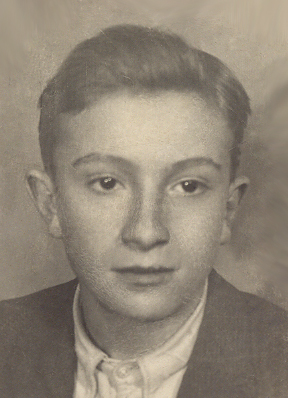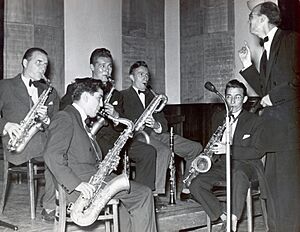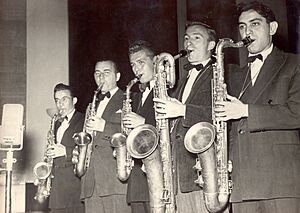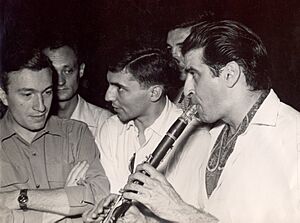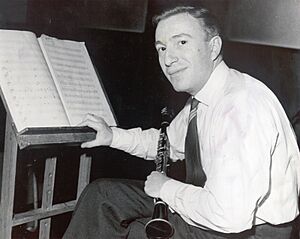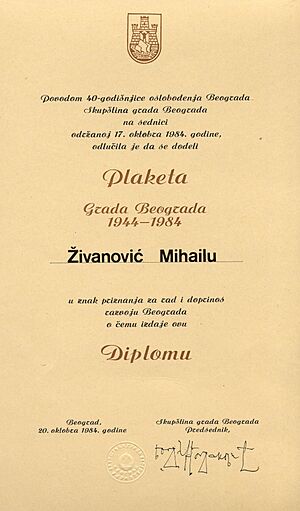Mihailo Živanović facts for kids
Quick facts for kids
Mihailo Živanović
|
|
|---|---|
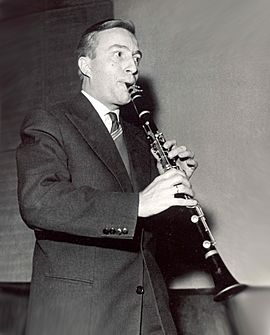 |
|
| Background information | |
| Birth name | Mihailo Živanović |
| Also known as | Žuti (Yellow) |
| Born | 17 February 1928 Belgrade, Kingdom of Yugoslavia |
| Died | 18 July 1989 (aged 61) |
| Genres | Classical, Jazz |
| Occupation(s) | Soloist, orchestral musician, composer, arranger and conductor |
| Instruments | Clarinet and baritone saxophone |
Mihailo Živanović (born in Belgrade on February 17, 1928 – died in Belgrade on July 18, 1989), also known as Mika-Žuti (Yellow), was a very important and creative Serbian and Yugoslav musician. He was an amazing clarinet and saxophonist player. He also wrote a lot of music as a composer, led orchestras as a conductor for RTB Light Music Orchestras, and created new versions of songs as an arranger.
Contents
Mihailo Živanović's Early Life
Mihailo Mika Živanović, nicknamed Žuti (Yellow), was born in Belgrade in 1928. His journey into music began early.
When he was eight years old, in 1936, Mika started primary music school. He first learned to play the piano. A big moment in his life happened in 1942. He heard the sound of the clarinet on Radio London and knew that was the instrument for him!
After that, he loved jazz music. He often went to concerts in Belgrade to listen to famous jazz musicians. Mihailo also studied at the Third Male Grammar School and a music school. He even started studying chemistry at university but decided to focus on music instead.
In 1945, after the war, Mihailo continued his piano studies. Then, in 1946, he found and bought his first clarinet. Since he already knew a lot about music, he practiced the clarinet day and night. By age eighteen, he was inspired by famous bands like Glenn Miller's. He decided to dedicate his life to the clarinet and music. He later graduated from music school, specializing in the clarinet.
Leading the Fis-dur Orchestra
Mihailo Živanović loved Jazz. In 1946, he started his own jazz orchestra called Fis-dur. He named it after his clarinet. Mihailo himself led this orchestra.
The Fis-dur orchestra quickly became very popular in Belgrade because of its great music. The first members included Milo Dimitrijević on guitar, Duško Radić on piano, Stanislav Sodermajer on drums, and Mihailo Živanović on clarinet.
Mihailo wanted to keep learning. In 1946, he continued studying clarinet at the Allmusic Academy. There, he met Eduard Sađil, another clarinet student.
The Fis-dur orchestra had many successful performances and tours. Audiences loved them! In 1947, new talented musicians joined the orchestra. These included Predrag Ivanović on trumpet, dr Aleksandar Pejić on accordion, and Milovan Vukajlović-Genije on piano and accordion. Only Sodermajer and Živanović remained from the original group.
A very important meeting happened in 1949. Mihailo met Boro Roković, a talented trumpeter and pianist. Bora was impressed by Mihailo's talent and invited him to join his orchestra. Živanović played with Bora's group until 1953. He was also invited to play in other orchestras at the same time. The Fis-dur orchestra continued until 1950.
Playing in the Radio Belgrade Revue Orchestra
In 1948, a famous trombonist named Mladen Guteša started the Radio Belgrade Light Revue Orchestra. A "revue orchestra" plays a mix of light music, often for shows. In late 1949, Guteša invited Mihailo Živanović to join.
Mihailo was still a student at the Music Academy. He needed permission from his professor, Bruno Brun, to take the job. His professor agreed. In the Revue Orchestra, Mihailo first played the baritone saxophone. Later, he played the clarinet, which was his main instrument.
The Radio Belgrade Revue Orchestra had many successful tours and concerts. One concert in Zagreb in 1953 showed that Belgrade was a major center for Yugoslav jazz.
Before finishing his studies in 1954, Mihailo left the Radio Belgrade Revue Orchestra. He took a job with the National Theatre Orchestra in Belgrade, where he worked for four years. While still a student, he won second prize in a national competition for young classical clarinet players in Skopje in 1954. He successfully graduated with his clarinet degree in 1955.
Mihailo Živanović's Octet
In 1955, Živanović formed his own group called Mihailo Zivanovic’s Octet. An "octet" is a musical group with eight members. In this group, Mihailo played the baritone saxophone.
Other members included Predrag Ivanović on trumpet, Nikola Dajzinger on alt saxophone, and Eduard Sađil on tenor saxophone. Predrag Stefanović played the trombone, Vojkan Đonovićić the guitar, Robert Hauber the piano, and Rade Milivojević the drums.
The Octet performed for 10 years and was very successful. They played on radio stations both in their country and abroad. This group quickly became one of the top Yugoslav ensembles for modern and experimental jazz music.
Later Career and Contributions
From 1958 until almost the end of his life, Mihailo worked for the Music Production branch of Radio Television of Serbia. In 1958, he joined the Light String Orchestra. Later, he became a conductor for the Jazz Orchestra and Revue Orchestra of Radio Television Belgrade. A conductor leads a musical group.
In 1960, he joined the Serbian Composers Association. In 1975, he became the head of the Light Ensemble of RTB. From 1978 until his death, he was the main conductor of the Light Orchestra of RTB.
Mihailo Živanović was a very busy composer. He wrote many different types of music. This included music for children, stage shows, popular songs, and concert music. He also created many compositions and arrangements for radio and TV stations in Yugoslavia.
He always kept up with the latest trends in jazz and light music. For over forty years, he successfully composed music in many different genres. He wrote more than 300 instrumental, light, and vocal songs.
Before Živanović, Belgrade jazz orchestras mostly played foreign jazz music. Mihailo was one of the first jazz musicians to compose modern jazz music from his own country. He put a lot of energy into this. His great knowledge and hard work helped make Yugoslav light and jazz music much richer. His many achievements are a permanent part of Yugoslav jazz history.
He wrote music for many popular singers of his time, like Arsen Dedić, Nada Knežević, Lola Novaković, and many others. He was also one of the most active composers of music for children.
When he was actively playing his instrument, he was known as one of the most creative and best soloists on the clarinet and baritone saxophone. He performed successfully in concerts at home and in other countries like Germany, Austria, Romania, and the USA. He even represented his country as a soloist at a concert in Berlin.
Mihailo also appeared as a conductor at Light Music Festivals. He was the conductor of the RTB Light Music Orchestra and the main clarinet player for the Belgrade RTV Symphonic Orchestra. Mihailo was also very skilled at making arrangements, leaving a big mark in that area too.
Mihailo Živanović's Musical Works
Mihailo Mika Živanović started composing in 1950. He created a huge amount of music:
Popular Songs
He wrote many popular songs, including:
- "Waiting"
- "If We Were Someone Else’s" (sung by Nada Knežević)
- "Old Oak" and "Traces" (sung by Krunoslav-Kićo Slabinac)
- "Don’t you Know that I Love You"
- "One Afternoon"
- "One Night" (sung by Dragan Stojnić)
- "Not Now" (from Belgrade Spring, sung by Arsen Dedić)
- "Come When the Winter’s Gone" (sung by Bisera Veletanlić)
Music for Instruments
He composed instrumental music, such as:
- "Cat Game"
- "Orient"
- "Five Giants"
- "Midnight Sounds"
- "The Merry Five" (music for an instrumental octet)
Music for Stage and Film
Mihailo wrote music for plays and movies:
- Music for the ballet "Frankie and Johnny" in 1962.
- Ballet Suite "Biljana" in 1963.
- Music for the film "Whistle at Eight," including "Vespa" and "Amusement Park."
Music for Clarinet and Orchestra
He wrote special pieces for clarinet with an orchestra:
- "Fantasy for Clarinet and Orchestra"
- "Rhapsody for Clarinet and Orchestra"
- "Blues for Clarinet" (he performed this in Berlin)
- "Rhapsody for Alto Saxophone and Symphony Orchestra" (performed at the NORD SEE Festival in Ostende, Belgium)
Jazz Orchestra Music
He also wrote pieces for standard jazz orchestras:
- "Abandoned Garden"
- "The Spring Landscape"
- "Salome"
- "Merry Rhythm"
- "Dreams"
Children’s Songs
Mihajlo Živanović wrote many songs for children, especially about friendship.
- "Hand in Hand" and "Empire of the Fellowship" are two of his most famous children's songs.
These songs were sung by the RTB Children’s Choir and popular children's performers.
Music for TV Shows
In his last 10 years, he regularly worked on children's television shows. He composed music for series like:
- "Cube, Cube, Little Cube"
- "Kolaric Panic"
- "Around the World in Eight Notes"
- "Cricket’s Album"
- "Guess"
He also composed a ballet suite for the Belgrade television show "Race," using a traditional folk melody.
Awards and Recognition
Mihailo Živanović received many awards for his artistic work:
- First prize from critics and second prize from the jury for his song "Clock’s Story" at a festival in Opatija in 1959.
- Second prize for his "Rhapsody for Clarinet and Orchestra" in 1961.
- Second prize at the Belgrade Spring Festival in 1961 for "Rhapsody for Clarinet and Symphony Orchestra."
- First prize for "Rhapsody for Clarinet" in 1974.
- First prize in Radenci, Slovenia, for "Sketch for Clarinet."
- Many awards at various festivals, including Belgrade Spring and JNA festivals.
- Awards from Radio Belgrade and JRT for children’s music.
- An award in Japan for his children’s song "Raindrops."
- He received the Order of Labour with a silver wreath.
- Second prize at the Yugoslav Young Artists Competition in Skopje in 1954.
- Award from the Serbian Composers Association.
- First prize in Vienna as a clarinet soloist for performing Artie Shaw's "Concerto for Clarinet and Orchestra."
- First prize from the Serbian Composers Association for his "Fantasia."
- He composed the new music for Radio Belgrade "News," which imitated a teleprinter.
- He received the Memorial plaque "Belgrade 1944-1984" in 1984. This was to celebrate 40 years since the liberation of Belgrade. The city recognized him as an important artist who helped Belgrade grow.
- He received a Gold Medal from the Union of Yugoslav Composers for promoting Yugoslav composers.
- He received a plaque from Radio Belgrade in 1986 for his long-time contributions to their programs.
Images for kids
 | Selma Burke |
 | Pauline Powell Burns |
 | Frederick J. Brown |
 | Robert Blackburn |


